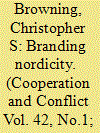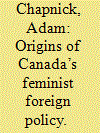| Srl | Item |
| 1 |
ID:
076798


|
|
|
|
|
| Publication |
2007.
|
| Summary/Abstract |
This article introduces the idea of brands to debates about Nordic models and identity. Understanding brands to be more strategic and stable than identities, the article shows how a Nordic brand was marketed during the Cold War, but has since been challenged and undermined by a number of pressures. Central to the Nordic brand have been ideas of Nordic 'exceptionalism'-of the Nordics as being different from or better than the norm-and of the Nordic experience, norms and values as a model to be copied by others. In the post-Cold War period, key aspects of the Nordic brand have been challenged. On the one hand, elements of the Nordic elite appear to have forsaken the brand. On the other, broader recognition of a distinct Nordic brand is being undermined with the melding of Nordic with European practices and processes. The article concludes by asking whether the decline of the Nordic brand matters and further explores the link between Nordicity as a brand and as an identity
|
|
|
|
|
|
|
|
|
|
|
|
|
|
|
|
| 2 |
ID:
167215


|
|
|
|
|
| Summary/Abstract |
In January 2019, a leading Canadian foreign policy blog, OpenCanada.org, declared that “[u]nder the government of Justin Trudeau, Canada has embraced a feminist foreign policy—gradually at first, and with fervor over the past year.” Although critics have debated the policy’s effectiveness, the embrace, if not also the fervor, was indisputable. By 2019, the Trudeau government’s second foreign minister, Chrystia Freeland, was proclaiming Canada’s feminist approach to international relations openly and regularly. The international community had also noticed. This article investigates the origins of the new Canadian foreign policy “brand.” It finds that, contrary to popular thinking, the prime minister himself played at most a minor role in the initiation of what became a full-fledged transformation of Canada’s global image.
|
|
|
|
|
|
|
|
|
|
|
|
|
|
|
|
| 3 |
ID:
087770


|
|
|
|
|
| Publication |
2009.
|
| Summary/Abstract |
Existing typological frameworks do not adequately categorize terrorist groups by their operational characteristics. We propose a new framework which compares terrorist groups to business firms. In our framework, terrorist groups are mapped on two axes: centralization of resources and centralization of operations. We separate terrorist groups into four typologies echoing familiar business arrangements: Hierarchy, Venture Capital, Franchise, and Brand. Responses to each typology are briefly sketched out. We conclude by analyzing the changes in Al Qaeda over the last two decades in the context of our framework. We close by proposing appropriate policy responses to combat Al Qaeda in light of its current Brand typology.
|
|
|
|
|
|
|
|
|
|
|
|
|
|
|
|